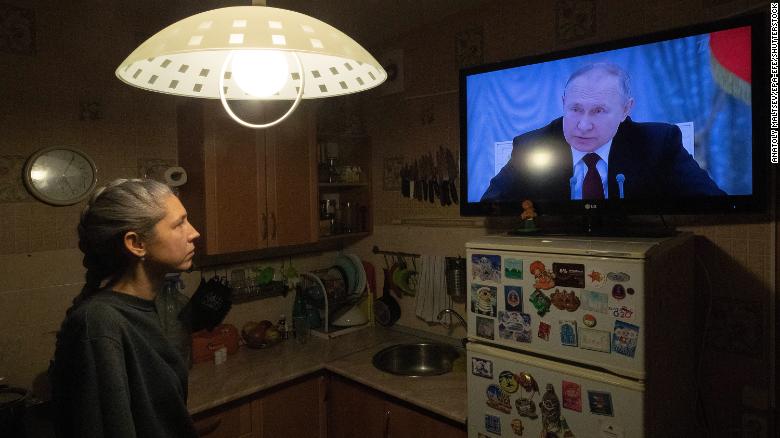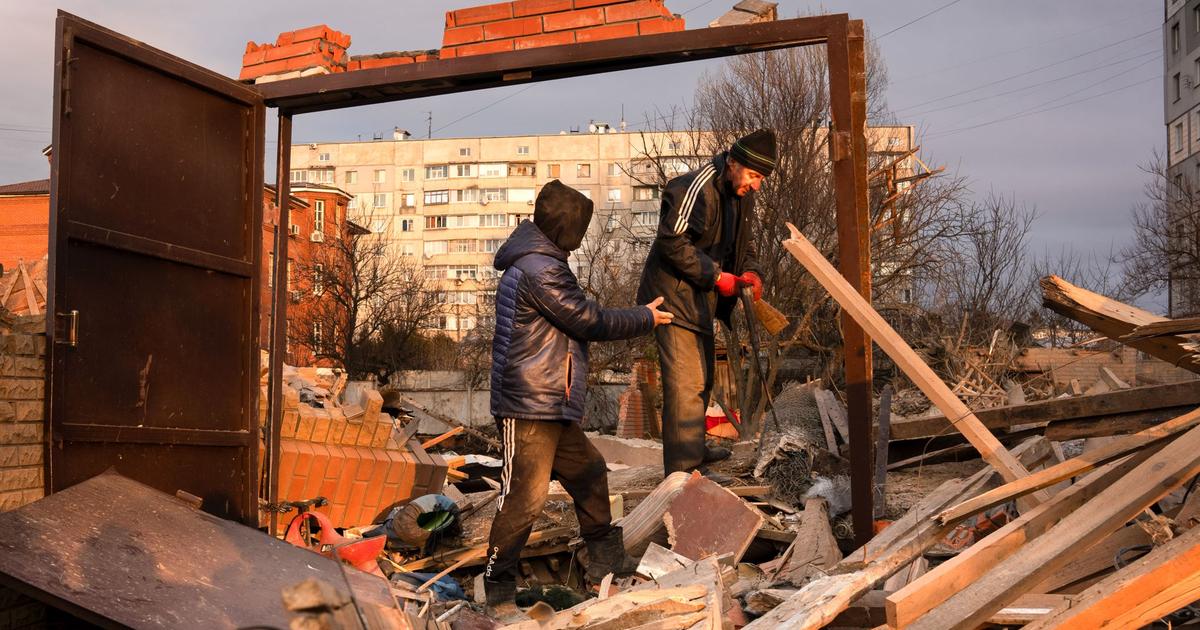Images from a supermarket in Russia show an extreme situation 4:31
(CNN) --
The harrowing video resembles the images audiences in the West receive from the war in Ukraine: A grandmother, bundled up in a thick jacket against the cold, stands crying in front of her now-burning wooden house. by a rocket that fell in his town.
"They destroyed everything!" she yells.
"Nothing remains".
But this is Russia's government-controlled television channel Rossiya24, and in this report, the soldiers attacking their village are Ukrainians, not Russians.
The Russian correspondent calls them "nationalists."
Other channel reports call them "neo-Nazis", "fascists" or "drug addicts" who use civilians as "human shields".
Almost all the information about the conflict comes from the breakaway region of Donbas in eastern Ukraine, specifically from the two self-proclaimed "people's republics" of Donetsk and Luhansk, mainly Russian-speaking entities that Russia recognized as independent states on February 21.
OPINION |
Is Putin betting on endless war?
That was the trigger for the Russian invasion of Ukraine, which provided Moscow with the pretext to invade, claiming that it had no choice but to "protect" them from an imminent attack by Ukraine, a charge which it strongly denies.
As a press report puts it: "Denazification was only possible with a military operation."
In the Russian broadcasts, the war in the rest of the Ukraine, the war that most people are witnessing around the world, is largely ignored: the remnants of Mariupol left behind by Russian bombing;
the charred skeletons of houses and buildings in Kharkiv, Chernihiv, Kherson, Zhytomyr and other cities decimated by Russian airstrikes;
the residential neighborhoods of the capital, Kyiv, along with their shocked and bleeding residents fleeing Russian bombing;
hardly any of this is shown on Russian television.
When it is shown, the blame is, of course, on the Ukrainian troops.
There is also no accurate coverage of the recent military setbacks suffered by the Russian Army.
advertising
The reports are emotional, often filled with accusations and angry threats.
On one of Russia's most popular talk shows, host Vladimir Solovyov lashes out at Europe and the United States, at one point mocking US media reports that Russian President Vladimir Putin is allegedly not being briefed by his advisers on what is really going on in Ukraine.
"You still don't know what answers we're preparing, you don't know where this is going, and you're really not going to like it, fellow Americans!"
Russian President Vladimir Putin attends a meeting with his Azerbaijani counterpart at the Kremlin on February 22, 2022.
A woman watches Putin speaking during a television broadcast of a National Security Council meeting on the recognition of the self-proclaimed Donetsk People's Republic and the Luhansk People's Republic, on February 21, 2022.
Putin, too, has been using cruder, more emotional language in his television appearances when he meets with his Security Council in virtual Zoom-like debates, or in person, with a member of his cabinet sitting at the opposite end of a ridiculously long table, to avoid any possibility of contagion of covid.
The West has only one goal, he said in a speech: "the destruction of Russia."
"But any people, and especially the Russian people," he assured his viewers, "will always be able to distinguish true patriots from scum and traitors, and will simply spit them out, like a mosquito that got into its mouth. ".
In the closed world of Russian propaganda, however, high emotionality cannot always make up for a lack of logical consistency.
Putin claims that Ukraine is not really a country, but a historical part of Russia.
The Ukrainians and the Russians, as he described it in a rambling treatise he published last summer, are one people.
And yet, in the war he himself ordered, the Russians are killing their Ukrainian "brothers."
Corpses of 'executed people' left lying in the streets of Bucha as Ukraine accuses Russia of war crimes
Throughout the news bulletins are short video clips intended to drum up support for the attack on Ukraine: eager youths running toward a formation that, from above, spells out the letter 'Z', the unofficial symbol of the Russian offensive against Ukraine, painted on nearly every tank and military armored personnel carrier in the war zone, and occasionally, back in Russia, spray-painted on doors by Russians expressing any opposition to the invasion.
In another "support the flag" video with short quotes from people who appear to be ordinary Russians, a man says, "I support our president!"
Another proclaims: "I fully support our president's policies to protect our people!"
Another says darkly: "We don't want NATO to come near us."
The last speaker implores: "Let us unite!"
In an Orwellian twist, the conflict in Ukraine has no choice but to be called a "special military operation."
Under a law passed on March 4, it is illegal to call war "war" or describe it as "attack" or "invasion."
Violators can be punished with up to 15 years in prison, as can news organizations that spread anything considered "fake news" about the "operation" or the Russian Army.
Quite simply, you don't see or hear any anti-war views in the Russian media.
The anti-war street protests that erupted across Russia in the first weeks of the fighting, in which more than 15,000 people were detained or arrested, are never shown on state television.
Police officers detain a protester in central Moscow on March 13, but Russian state television shows no opposition to the war.
informative block
The Putin government has been methodically eliminating Russia's free media for years, and at the start of the war, the two remaining independent media outlets, TV-Dozhd (TV-Rain) and Echo Moscow Radio, closed after the passage of the new law "Don't say war".
Now all of the media is controlled by the government, either directly or through pro-Kremlin owners, and most Russians, with the notable exception of young people, get their news and information from television.
Online information sources such as Facebook, Twitter, Instagram and other foreign social media platforms have been blocked.
So are the international Russian-language media outlets, such as the BBC and Radio Free Europe/Radio Liberty.
This news blackout appears to be having some success in convincing the Russians that their president's war is justified.
Subjected to the avalanche of propaganda lies that Nazis rule Ukraine, that fellow Russians in Donbas are victims of "genocide", that Russia itself is in mortal danger of NATO attack, it may be understandable that many Russians support the war.
ANALYSIS |
Western spy agencies hijack intelligence to try to undermine Putin
A poll in March by the Levada Center, an independent pollster, indeed suggested that Putin's ratings had risen since the start of the war, with 83% of those polled saying they approved of the president, compared to 69% in January.
But it is clear that polls are not necessarily reliable in a country where people are subjected to a flood of propaganda and dissent is not tolerated.
Ukrainians will suffer for years to come from the destruction unleashed by this unnecessary war.
But also the Russians will suffer the effects of this ruthless information war waged by their own government.
war in ukraine









/cloudfront-eu-central-1.images.arcpublishing.com/prisa/KMEYMJKESBAZBE4MRBAM4TGHIQ.jpg)


